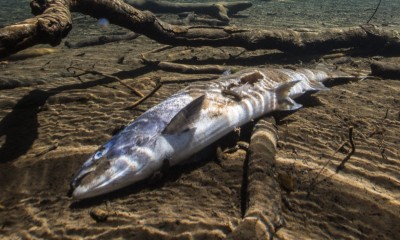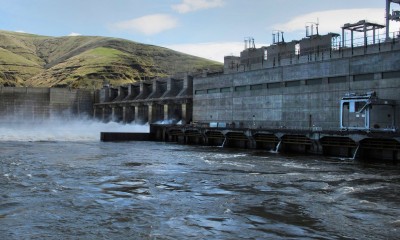Washington can ensure the Columbia Basin’s federal-dam operators address rising water temperatures, protect salmon, and help save the Southern Resident orcas from extinction.
Clean Water Act 401 Certification for Columbia & Snake River Dams
The decline of Columbia Basin salmon runs contributes to the starvation of the Southern Resident orcas and recently forced Washington to close the Columbia River to fall salmon fishing. Washington can use its authority under the Clean Water Act to do what the Trump administration and federal agencies cannot or will not do: protect and restore salmon.
Learn more:
- Fact Sheet: Salmon, Orcas, & 401 Certification
- A Primer: Washington’s Clean Water Act 401 Certification Authority and Federal Dams
- Columbia Riverkeeper’s Clean Water Act Lawsuit Over Oil Pollution from Federal Dams
- "Washington state to regulate federal dams on Columbia, Snake to cool hot water, aid salmon" via Seattle Times, January 31, 2019.
- "EPA ices Washington state’s effort to regulate hot water in Columbia, Snake rivers" via Seattle Times, February 6, 2019.
Washington has an exciting opportunity to tackle the orca and salmon crisis.
FOR IMMEDIATE RELEASE
Trump Administration’s Moves to Undercut States’ Rights to Protect Clean Water
Endangered species at risk by revocation of water permits
Olympia, WA (February, 8, 2019)—The Trump administration and Washington State squared off this week over the U.S. Environmental Protection Agency’s (EPA) decision to rollback efforts to tackle pollution from federal dams on the Columbia and Snake rivers. In response, a coalition including American Rivers, Columbia Riverkeeper, the Natural Resources Defense Council, the Northwest Sportfishing Industry Association, Pacific Rivers, and Save Our Wild Salmon issued the following statement.
“This is Washington D.C. reaching across the map to restrict Washington State’s ability to protect its most endangered species,” said Giulia Good Stefani, senior attorney with the Natural Resources Defense Council. “We cannot let the Trump administration run over the State of Washington’s right to protect its endangered orcas and salmon. We have an urgent temperature crisis on the Columbia and Snake Rivers.”
“The Trump Administration’s dirty politics have no place in the Pacific Northwest. We applaud Washington State and Governor Inslee for standing strong to protect salmon, and the orcas that depend on salmon, from lethally hot water and oil pollution caused by the federal dams,” said Brett VandenHeuvel, Executive Director for Columbia Riverkeeper.
“We have a temperature crisis on the Columbia and Snake rivers, and the need to address the problem is urgent, for salmon, orca and salmon-dependent communities,” said Liz Hamilton, Executive Director for the Northwest Sportfishing Industry Association. “Without reducing temperatures in the Columbia there will be less salmon and more starving orca in our future. Our industry has not recovered from the salmon die-offs in 2015, and we cannot survive more in the future.”
“We are disappointed by the recent decision from EPA Region 10 to undermine a State-led public process to protect water quality by withdrawing its draft permits regarding the Clean Water Act certification for the Columbia and Snake River dams,” said Wendy McDermott, American Rivers’ Director of the Puget Sound and Columbia River Basin. “The Washington Department of Ecology has already initiated its public comment period and the EPA should respect this process under the Clean Water Act and allow the public to have a say in the future of the fish, wildlife, and people that rely on the Columbia River.”
“River temperatures in the Columbia and Snake rivers are not going to improve without structural and operational changes at mainstem dams,” said Greg Haller, Executive Director of Pacific Rivers. “There are options available that will help salmon and steelhead in a warming climate. Federal dams, like privately-owned dams, need to comply with the Clean Water Act and state water quality standards.”
Background
Last week Washington State announced plans to initiate state regulation that would require the federal government to address oil pollution and salmon-killing hot water in the Columbia and Snake rivers. Fewer than 48 hours after Washington State opened a public input process, the Trump administration pulled the rug out from under the State. The administration withdrew its original request for Clean Water Act certification from the State.
Late in 2018, the Trump administration sent Washington State draft pollution permits for nine federally owned and operated dams located in Washington State. The water pollution permits triggered Washington State’s right to enforce the state’s water quality standards, including for oil pollution and temperature.
As reported in the Seattle Times, on January 30, 3019, Washington State initiated a public comment process on draft water pollution permits for nine federal dams located on the Columbia and Snake Rivers.
On February 1, 2019, EPA wrote to the State to announce its withdrawal of the draft water pollution permits that were under review. The request also included the unusual ask that all documents related to the draft permits be returned to the federal government.
In an emailed statement to the Seattle Times, Governor Inslee’s Office stated: “[T]he governor is fully committed to partnering with Ecology to ensure both federal and state clean water standards are upheld and enforced . . . .The Trump Administration must do its part to protect our state’s salmon and waters.”
The nine federal dams create large reservoirs of slow-moving water that frequently get too hot for salmon to survive. According to the Fish Passage Center, an independent federal agency, the “long-recognized and largely unaddressed problem of high water temperatures” in the Columbia and Snake Rivers is “an ever-increasing threat to the survival of salmon.” When river temperatures exceed 68F for several days at a time—as happens with increasing frequency—salmon have difficulty migrating upstream and begin succumbing to stress and disease. The dangerous impact of the dams is only exacerbated by climate change.
Columbia and Snake River salmon are critical for local economies, communities, recreational and commercial fishermen, and a large number of species whose life cycles depend on salmon. The highly endangered Southern Resident orcas depend on Columbia Basin spring Chinook as a major source of food. These fish sustain them through the winter months and feed nursing orca mothers and their calves during a particularly critical time in their life-cycle.
In 2014, Columbia Riverkeeper settled a lawsuit against the U.S. Army Corps of Engineers to stop oil pollution from eight dams on the Columbia and Snake Rivers, including Bonneville, John Day, The Dalles, and McNary, Ice Harbor, Lower Monumental, Little Goose, and Lower Granite. In 2016 Riverkeeper settled a similar lawsuit against the U.S. Bureau of Reclamation for unauthorized oil pollution at Grand Coulee Dam. The settlements required the Army Corps and Bureau to apply for water pollution permits from the EPA. The permits would require the Corps to monitor and reduce oil and other water pollution from the dams. To date, the federal government has not taken action to address temperature and reduce oil pollution at the dams.
The Trump administration planned to issue pollution permits this year, but it halted the permitting process on February 1 following Washington State’s announcement that it would exercise its authority to require the federal government to address temperature and oil pollution at the dams.
###

"Washington state to regulate federal dams on Columbia, Snake to cool hot water, aid salmon" -Seattle Times

Columbia Riverkeeper fights to protect salmon from hot water, habitat loss, toxic pollution, and dangerous fossil fuel proposals.

"EPA ices Washington state’s effort to regulate hot water in Columbia, Snake rivers" -Seattle Times


